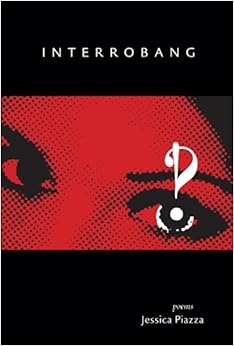REVIEW
A Review of Jessica Piazza's Interrobang | Katherine Hoerth

Interrobang by Jessica Piazza
Red Hen Press, 2013 (72 pages)
ISBN: 978-1597097222
Red Hen Press, 2013 (72 pages)
ISBN: 978-1597097222
In her debut collection, Interrobang, Jessica Piazza explores the intricacies of identity through form - essentially following in Millay's footsteps to encapsulate chaos into fourteen lines with rollicking meter and the subtle echoes of rhymes. This collection contemporizes and reinvigorates formal poetry through fresh language and subject matter that reflect on our current sensibilities. These poems hold a mirror up to readers, and display portrait that's polished and crafted on the outside, but take a close look, and they're filled with all the complexity, obsessions and insecurities that fill us all.
Interrobang takes readers through the speakers' mindscapes, investigating the building blocks of identity: what we love and what we fear. In the poem "People Like Us" the speaker, through a series of expertly strung together sonnets in iambic hexameter, reflects on the reasons why "we make the same mistakes again" in love and relationships. The poem follows the speaker's love affair from the "nonstop if/then … a love me, love me not lament" to the "Drawn curtain: faded, black. We fucked. We hollered" and finally to the "inevidable mess we've been, / unmade again." The poem ends in a similar place where it began, with the declaration that it's a "Mistake I'll never make again." It's easy to relate; with deft honesty and vulnerability, we as readers can't help but be sucked into the cycle of brokenness and wholeness, of love and fear, of vulnerability and strength. Essentially, we're all like the speaker — "we're dust, we're everywhere," (24).
Many of the poems in this collection explore the extremes of the human condition and the horrible point where love becomes obsession and fear becomes phobia. Most pieces derive their names from actual disorders, "Clithrophila," for example, explores a speaker's mind who loves being enclosed in small spaces — "a closet; a stall; / the crevice between your flesh and the wall" (27). Another particularly poignant and heart-wrenching poem is "Pediophilia" which explores a mother's grief and how she tries to fill the void of a deceased daughter with dolls:
"The first an angel: fearsome, glass-glazed gift
to dull a mother's utter grief: the next
a paint and porcelain she numbly bought
from QVC. It looked like her."
"She weeps in overflowing sea of limbs
That manage, year by year to commandeer
The bed, the floor, and more. An orphanage
Of girls. A thousand eyes that cannot shut (39)."
Piazza's phobia poems are no less revealing, and many of them explore fears that come from within. In "Patroiophobia" a fear of heredity, the speaker laments "a tricky heirloom passed / to her at birth" — a family's high expectations, for which the solution is simply to be set free — "renounce a family tree for solid ground" or the finding of one's self (57). In "Melophobia," a fear of music, the speaker fears "a voice too frail, too thin" and reveals that the overwhelming aspect of creating music is the fear of sounding "as much yourself as possible," (19).
The poem "Nephophobia" is particularly interesting. It explores a woman's fear of seemingly harmless clouds and how she's haunted by "the sky's / stark darkening as winter months encroach." The poem's turn, though, puts this phobia into perspective:
"But strange: the same sad girl finds butterflies
In summer, softly steals to where they perch
And smoothly clasps one colored wing. She'd see
Her power if she knew the slow command
That wing beats have of winds. A deity;
A woman trapping weather in her hands (61). "
Interrobang is both cutting and crafted. The collection draws its power from the way the poems brush up against each other and dig deeper into what makes us who we are. It explores the spectrum of the human spirit — from its power to its ruin. It's a masterful, polished mess, and the truth of the matter is, "this mess is us" (32).
Katherine Hoerth is the author of three books of poetry: a collection titled
The Garden Uprooted (Slough Press, 2012), and two chapbooks titled The Garden of Dresses (Mouthfeel Press, 2012)
and Among the Mariposas (Mouthfeel Press, 2010). She teaches writing at South Texas College, and edits poetry
for Fifth Wednesday Journal.
